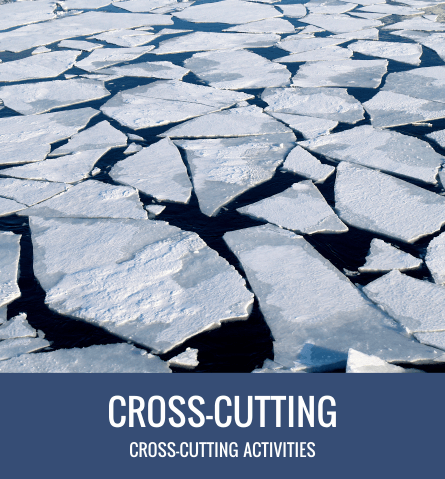 IASC aims to facilitate international and interdisciplinary Arctic science. To meet this aim, it allocates funds each year for Cross-Cutting Activities – activities that are supported by at least two of the five IASC Working Groups (WGs). From 2021, cross-cutting activities can be also supported by the International Science Initiative in the Russian Arctic (ISIRA) to promote the participation of Russian scientists.
IASC aims to facilitate international and interdisciplinary Arctic science. To meet this aim, it allocates funds each year for Cross-Cutting Activities – activities that are supported by at least two of the five IASC Working Groups (WGs). From 2021, cross-cutting activities can be also supported by the International Science Initiative in the Russian Arctic (ISIRA) to promote the participation of Russian scientists.
The objective of this WG-spanning program is to promote system-scale activities within IASC and to encourage the WGs to explore interdisciplinary activities, in particular across the natural and social sciences.
This year, IASC received strong applications totaling requests more than 185,000€! All applications were reviewed and evaluated by the IASC Working Group members.
IASC is happy to announce that it will support, in whole or part, the following activities for 2021-2022:
- Indigenous-led Wildlife and Protected Area Management (Victoria Bushmann)
- Scientists and Educators Co-developing Education Outreach and Communication tools for The Polar Resource Book (Sophie Weeks)
- “AGORA (A collaborative Arctic research community assessment of interactions between global change drivers, societies and subsystems through space and time) (Sergi Pla-Rabes and Clay Prater)
- Co-creating Arctic Research together with Indigenous Rights holders (Annette Scheepstra, Gertrude Saxinger, Elle Merete Omma)
- Enabling Early Career Scientist and/or Indigenous Participation in Internationally Cross-Platformed Research Cruises (Lee Cooper and Jackie Grebmeier)
- Quantifying the Indirect Effect: from Sources to Climate Effects of Natural and Transported aerosol in the Arctic (Gillian Young)
- Race and Systemic Bias Crosscutting Workshop (Samantha Buzzard)
- ArcticLight Network (Nicholas P. Huffeldt)
- Beavers and the borealisation of the Arctic: Understanding cascading social and biophysical change (Helen Wheeler)
- Karthaus Summerschool on Ice Sheets and Glaciers in the Climate System (Carleen H. Tijm-Reijmer)
- International MOSAiC Science Conference, Autumn 2021, in Berlin, Germany (Markus Rex, Matthew Shupe)
- Global ecological and economic connections in Arctic and sub-Arctic crab markets (Brooks Kaiser)
- The Contribution of the Reproductive Health and the Quality of the Arctic Environment (Natalia K. Belisheva)
- Changing Artic rivers’ behavior: what is the Inuit perception? (Flore Sergeant)
Updated information about, and outcomes from, these activities will be posted here.
Further questions on IASC cross-cutting activities should be directed to the IASC Secretariat.
